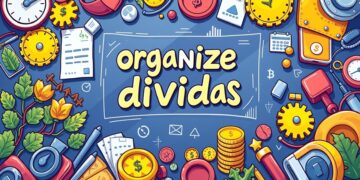
How to Organize Your Debts Using Free Digital Tools
Managing multiple debts can be overwhelming, but free digital tools can simplify the process. By using these tools to organize, track payments, and develop tailored repayment strategies, individuals can regain control over their financial situations, avoid late fees, and work towards debt-free living more effectively.

How to choose the ideal credit card for your financial profile
Selecting the right credit card involves understanding your financial habits and goals. Consider your spending patterns, desired rewards, fees, and credit score to find a card that enhances your financial journey while minimizing costs. A well-chosen card can empower you and improve your overall financial health.

How to choose safe and low-cost brokerage firms
Choosing a brokerage firm involves evaluating key factors such as regulatory compliance for safety, fees to ensure affordability, customer service for support, and the variety of investment options available. Conducting thorough research allows investors to make informed decisions that align with their financial goals and enhance their trading experience.

Investment Strategies in Stocks for Beginner Investors
This article provides beginner investors with essential stock market strategies, including buy and hold, dollar-cost averaging, and value investing. It emphasizes the importance of understanding risk tolerance and diversification while encouraging continuous learning for confident investing. Each strategy aims to enhance financial growth and stability in the stock market.

Difference between stocks, ETFs, and index funds: what to choose
Understanding the distinctions between stocks, ETFs, and index funds is essential for effective investing. Each option offers unique benefits and risks, aligning differently with individual financial goals, risk tolerance, and investment horizons. By evaluating these factors, investors can build a diversified portfolio tailored to their needs.

Automating Your Finances: Apps That Make Your Life Easier
Discover how financial automation apps simplify personal finance management. These innovative tools save time, reduce errors, and enhance budgeting. By integrating real-time alerts and educational resources, they empower users to make informed financial decisions, fostering greater literacy and discipline in achieving financial goals.

How to choose the ideal debt calculator for your needs
Efficient debt management is crucial for financial health. This guide helps readers select the ideal debt calculator by highlighting key features to consider, such as usability, customizability, and comparative analysis capabilities. Choosing the right tool empowers individuals to effectively navigate their debts and achieve financial freedom.

Strategies to Rebuild an Emergency Fund After a Crisis
Rebuilding an emergency fund is vital for financial stability after a crisis. The article outlines practical strategies, including setting clear goals, automating savings, and reducing unnecessary expenses. By prioritizing savings and enhancing financial literacy, individuals can better prepare for unforeseen challenges and secure their financial future.

How many months of expenses should the emergency fund cover
Building an emergency fund is crucial for financial stability, typically covering 3 to 6 months of expenses. Individual circumstances, such as job stability and family obligations, affect the ideal fund size. Tailoring your emergency fund to your needs ensures preparedness for life's uncertainties while maintaining peace of mind.

Complete guide to building an emergency fund from scratch
Establishing an emergency fund is essential for financial stability and stress reduction. This guide outlines key principles and practical steps for building your fund, including setting savings targets, choosing the right accounts, and staying motivated. A strong emergency fund empowers you to face unexpected challenges with confidence.